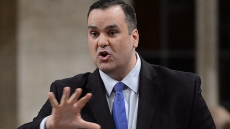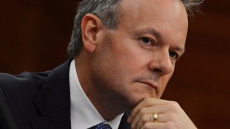TORONTO — Educators across Canada are increasingly seeing the value of teaching kids the basics of money management at a young age, but some experts warn the patchwork of programs being offered in schools can only go so far in helping students avoid major money pitfalls down the line.
School systems in several provinces _ including Ontario, Quebec and Saskatchewan _ have in recent years added elements of financial literacy to the core classes taught through elementary and high school, while British Columbia more than a decade ago created a mandatory Grade 10 financial life skills class.
But in order to truly make those lessons sink in, schools must have a designated financial capability curriculum that's applied across the board, some experts say.
"Unless you have a focused, consistent curriculum designed specifically and implemented across the majority of grades, so it knows where it ended last year and it's going to pick up and add more information...it's never going to work," said Gail Vaz-Oxlade, the financial guru behind the TV show "Til Debt Do Us Part" and author of "Money-Smart Kid$" and other books.
"And the problem we have right now is that by using the word 'money' or using money context for traditional lessons, (school) boards are convincing parents that they're putting financial literacy into schools — but they're not," Vaz-Oxlade said.
In Ontario, the focus in the classroom is largely on the math aspect of money management, "but those things are not the issue in terms of how to deal well with money," she said. "The issue in terms of how to deal well with money are things like you can't spend more money than you make."
A 2012 study by the Investor Education Fund found only 40 per cent of participating Ontario high school students felt somewhat or very prepared to manage their finances after graduation, and roughly a quarter said their schools gave them most or all the financial information they needed.
Sixty-nine per cent said they thought personal finance should be taught in the classroom, according to the study, which was based on an online poll of 400 high school students.
As part of its curriculum review process, the Ontario Ministry of Education has "further integrated financial literacy concepts and skills" in the curriculum for grades four through 12, a ministry spokesman said.
"While the Ministry of Education is responsible for developing curriculum policy, implementation of policy is the responsibility of school boards. Teachers plan units of study, develop a variety of teaching approaches, and select appropriate resources to address the curriculum expectations, taking into account the needs and abilities of the students in their classes," Derek Luk wrote in an email.
The province has also invested more than $2.5 million in financial literacy resources and professional learning opportunities for educators, he said.
There's been significant momentum in recent years in terms of bringing financial education into the classroom, said Gary Rabbior, president and CEO of the Canadian Foundation for Economic Education.
The foundation runs the Building Futures program, which "helps teachers to integrate a basic economic and financial education into the grade 4-10 school curriculum," according to a news release. The program is already in place in Manitoba, with Saskatchewan soon to follow suit and talks underway with several other provinces.
While making financial education compulsory across Canada would be beneficial, schools simply aren't ready for such a major change at this time, Rabbior said.
"Throwing something compulsory on an education system that isn't prepared for it often has negative results. You have to invest the time to train the teachers, have effective resources that can prepare the system for broad-based implementation," he said.
"We're hoping that with all the interest now, and the higher priority and the willingness to do something, there can be efforts invested over the next three to five years to prepare the system, make schoolboard people aware of it, train teachers to be able to do it, equip them with resources they feel comfortable with and fit with what they think is appropriate for their kids," so that it can eventually be mandatory, he said.
In the meantime, initiatives like the annual Talk With Our Kids About Money Day _ also run by the CFEE _ as well as workshops and other programs fill the gap for students worried about how to balance their pocketbooks.
Students at Father Lacombe High School in Calgary were taught about credit cards and budgeting in a 45-minute workshop held last month as part of Financial Literacy Month.
For Henry Pham, 17, the workshop was "a good reality check for the future."
"I know the majority of us are really not good with money," Pham said of himself and his peers. "We won't have enough money to save up for university, pay for our school fees, and a lot of people, they take student loans because they're just not good at saving money and it's really not good to be in debt."
Having structured, hands-on lessons on dealing with budgets and other practical topics would help students get their spending under control before they do too much damage, said Charlene Madayag, 17.
"At school people just spend their money _ for lunch, every lunchtime, they always buy a $5 meal and that can waste so much money and they don't notice that and for us to know that that is how much we spend in a month or a year in school..." she said.
"Having a class like that for financial things, it would be really really helpful."
Still, it's not entirely up to schools to instill good financial habits into children, said Vaz-Oxlade, whose career revolves around rehabilitating adults' attitude toward money.
Parents need to transmit those lessons in day-to-day life, and that means getting their own house in order first, she said.





